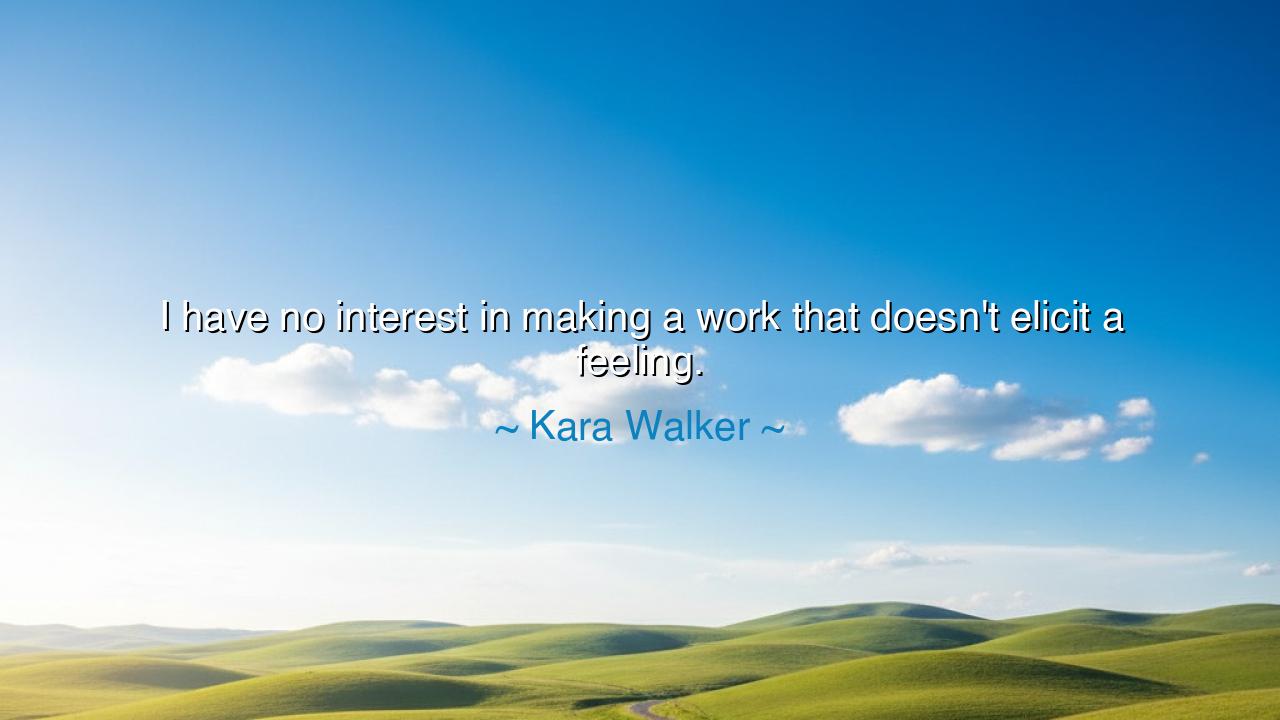
I have no interest in making a work that doesn't elicit a






In the profound words of Kara Walker, “I have no interest in making a work that doesn’t elicit a feeling,” we find the essence of what it means to be an artist. A true work of art is not merely a collection of shapes, colors, or words, but a living vessel through which the spirit speaks. To create without stirring the heart is to weave a tapestry without thread, empty and without purpose. Walker reminds us that the highest calling of the artist is to awaken feeling—whether joy, sorrow, anger, or reflection—in the soul of those who behold it.
The origin of this truth lies deep in the ancient traditions of storytelling and sacred art. Long before the written word, our ancestors painted on cave walls, sang songs around fires, and carved symbols into stone. These creations were never made for decoration alone; they were offerings, meant to stir awe and reverence, to unite the tribe through shared feeling. Through the ages, poets, painters, and prophets alike have understood that art without emotion is but an empty shell. Walker’s words echo this lineage, standing as a reminder of the divine responsibility carried by all creators.
To elicit feeling is to bridge the distance between hearts. A work that stirs no response lies cold and lifeless, like a bell that cannot ring. But when a creation awakens emotion, it breathes life into both the artist and the audience. Even pain and discomfort, when drawn forth by art, have value, for they reveal truths that are often hidden. In this way, the artist becomes not just a maker of objects, but a guide who leads others through the unseen landscapes of the human spirit.
Thus, these words call all who create to walk the path of authenticity. Let the artist seek not applause or perfection, but the raw and unspoken truths that dwell in the heart. For when work is infused with feeling, it transcends time and place, becoming part of the eternal dialogue between souls. And in this sacred exchange, the creator and the beholder are bound together, sharing in the wonder and pain of existence itself.






NVChung Nguyen van
I completely agree with the sentiment in Kara Walker's quote. When I look at art, I want it to make me feel something—whether it’s joy, sadness, or even anger. But then I wonder, what about abstract art or pieces that don’t immediately strike you with emotion? Do they still have value? Is it possible for an artwork to be thought-provoking without being emotionally impactful? I think it’s a complex balance.
DKNguyen Dang Khoa
Kara Walker’s statement makes me question what role art plays in our lives. It’s true that most of the most memorable works stir up some emotion, but can art be truly effective without this emotional component? I think of minimalist art or conceptual pieces, which sometimes feel more intellectual than emotional. Does that diminish their value, or can they still contribute something meaningful to our lives?
VHNguyen Van Hung
This quote challenges the idea that art should be something purely aesthetic. I’ve often wondered about how much emotion art should evoke. There are some works of art that leave me feeling unsettled, while others make me smile. Is that really the measure of good art, though—how it makes us feel? Shouldn't art sometimes challenge us to think, even if it doesn't elicit a direct emotional response?
MDMy Do
I find Kara Walker's quote intriguing. Art that doesn't make you feel something seems almost irrelevant in a way. Do you agree with this perspective, or do you think there’s room for art that’s more subtle or cerebral? There are pieces that are appreciated more for their technique, historical value, or concept, but do they truly move us in the way Walker describes? How much of art should be about emotion versus thought?
TMnguyen thi thao my
Isn't it interesting how art, at its core, is meant to provoke some kind of emotion? Kara Walker seems to emphasize that making something purely technical or without feeling defeats the purpose of art itself. Can art truly be considered meaningful if it doesn't stir any emotion in the viewer? What do you think—should art always elicit a strong reaction or can it simply be appreciated for its technique and beauty?